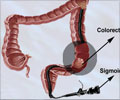A daily dose of vitamin E and selenium did not prevent polyps that are the premalignant precursors to most colorectal cancers.

‘The occurrence of premalignant polyps was about the same among men, regardless of whether they were taking selenium or vitamin E.’





A daily dose of vitamin E and selenium did not
prevent prostate cancer, revealed results from a landmark cancer prevention trial run
by SWOG. In fact, the Selenium and Vitamin E Cancer
Prevention Trial (SELECT) showed that vitamin E supplementation
increased the risk of prostate cancer in healthy men.Now, a SWOG review of ancillary SELECT results definitively shows that these two antioxidants also don't prevent colorectal adenomas - polyps that are the premalignant precursors to most colorectal cancers. Results are published in Cancer Prevention Research.
"The message to the public is this: Vitamin E and selenium will not prevent colorectal adenomas, which are surrogates for colorectal cancer," said Dr. Peter Lance, lead author of the journal article and deputy director of the University of Arizona Cancer Center. "We have no evidence that these supplements work to prevent cancer."
"There's a whole industry that has people dosing themselves thinking that vitamins will keep them healthy," Lance said. "But we have little evidence that they protect against cancer."
To arrive at their conclusions, Lance and his SWOG team used data from SELECT, a prostate cancer prevention trial that enrolled an astonishing 35,533 healthy men - 21% men of color - in just 33 months at 427 study sites the United States, Canada, and Puerto Rico. Men were randomized into four groups. Some took a daily dose of vitamin E, others a dose of selenium, others took both antioxidants, and the rest took a placebo only.
Advertisement
A statistical analysis showed that the occurrence of one or more premalignant polyps was about the same among men, regardless of whether men were taking selenium or vitamin E, alone or together, or double placebo.
Advertisement
Lance led another University of Arizona Cancer Center team that has just published similar results from a separate randomized trial of selenium and celecoxib. In December 2016, in the Journal of the National Cancer Institute, the team reported that selenium didn't prevent colorectal adenomas - and was associated with increased risk for Type 2 diabetes.
Source-Eurekalert















